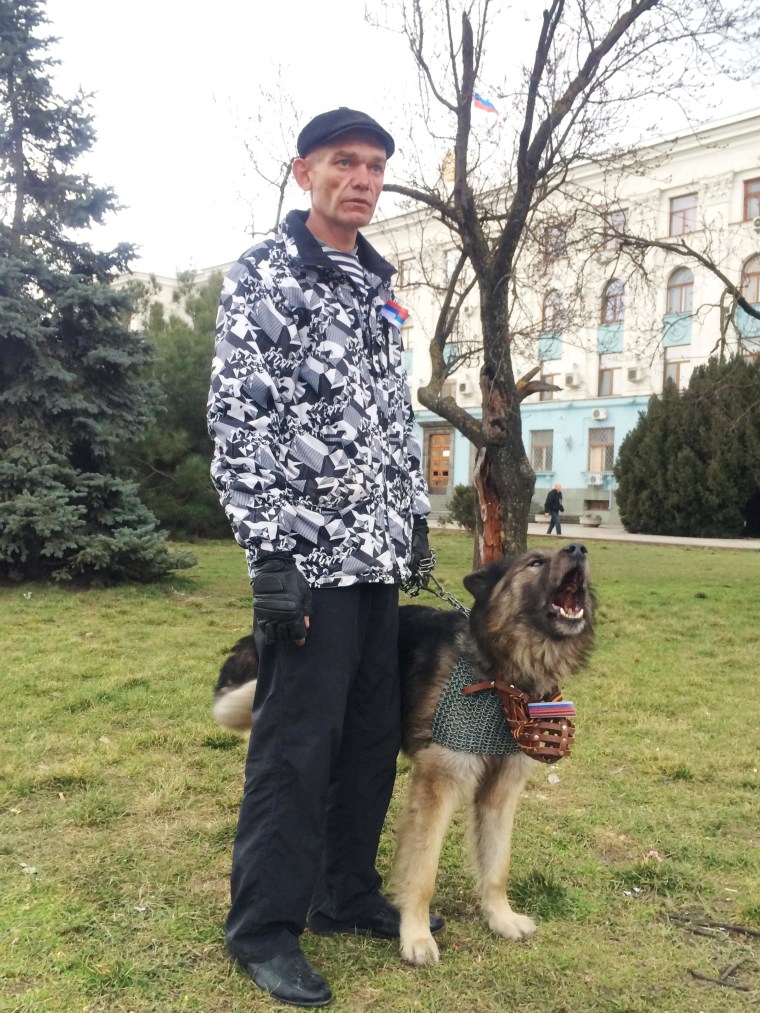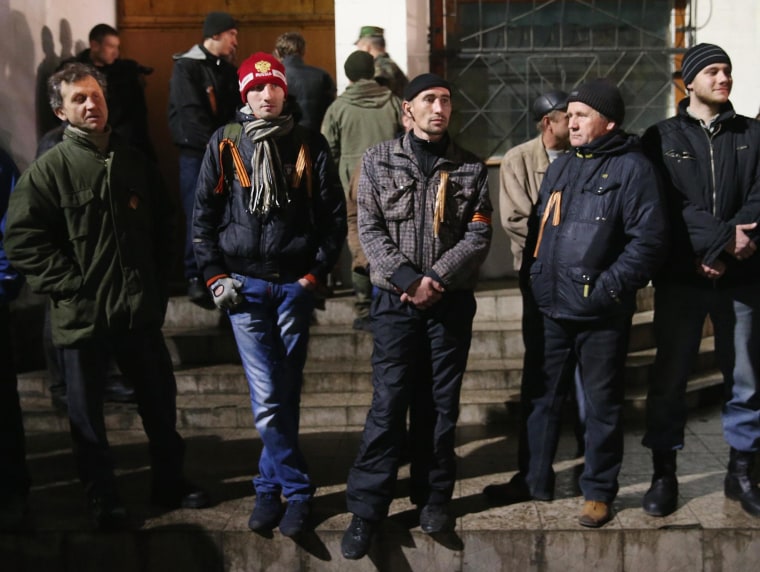SIMFEROPOL, Crimea — Pro-Russia militias have taken root on the streets of Crimea’s capital city of Simferopol since the dramatic events in Kiev, the Ukrainian capital, nearly two weeks ago.
The self-defense units are populated by men often dressed in civilian clothes — though they are increasingly in surplus military camouflage — distinguished by black and orange ribbons or red armbands.
But these are not the Russian soldiers who were in plain view on the streets of Simferopol after the Russian incursion in Crimea.
The uniformed troops are off the streets now and are being kept inside, according to one self-defense member, leaving the work of patrolling the streets to these local citizen guards.
On Wednesday, the U.N. special envoy to Ukraine's Crimea region, Robert Serry, was forced to abandon his mission and flee the city after some of these armed men besieged him in a local cafe, chanting “Russia! Russia!”
Many of these men say they have joined the local militia out of an affinity for Russia and a general disdain for Kiev's revolutionary movement and its right-wing factions — which they believe are thinly veiled ultra-nationalist and fascist groups.
“We don’t want that mess in Kiev to be repeated here. We want peace and we don’t want war here on our land,” said Evgeniy, 36, who worked as a web designer in Simferopol before he became a self-defense member.
Evgeniy, who did not want his full name used, said he went to Maidan Square in Kiev last November to get a sense of the movement that ultimately drove President Viktor Yanukovych out of office and out of the country.
He said he was disgusted by flagrant Neo-Nazism among the protesters and became convince that autonomy is the only path for Crimea.
“I want Crimea to be autonomous and I want us to have an individual government elected by us,” Evgeniy said. “I want us to have complete autonomy — but with the support and good relationship with Russia.”
The identity of the troops and militia members in Crimea has become a diplomatic point of contention.
Russian Foreign Minister Sergei Lavrov said the Kremlin does not command the local, pro-Russian "self-defense" militias.
During a congressional hearing Wednesday, Sen. Roger Wicker, R-Miss., asked U.S. Secretary of Defense Chuck Hagel and Chairman of the Joint Chiefs of Staff Army Gen. Martin Dempsey if they had asked their Russian counterparts for information about the military men in Crimea.
Dempsey said he did ask the Russian defense chief that very question and the answer was that they are "not regular forces, they were well-trained militia forces responding to threats to ethnic Russians in the Crimea.”
But Dempsey doesn't buy that.
He said his "military judgment is that these are soldiers who have been taken out of their traditional uniforms and re-purposed for placement in the Crimea as a militia force."
Hagel added, "It's pretty clear that they are Russian troops."
“Tsar Peter the Great said once, ‘If some land raises the Russian flag, it should be up there forever.’ The flag should never come down.”
But the local militia members say the region's historic ties to Russia are fueling the self-defense activities, along with fears of a Ukrainian nationalist movement.
“I’m not judging the people on Maidan, obviously they have a tough life and I’m not judging them,” said Alexandr Gerasimov, 48, a former Ukrainian border guard who has been standing guard in Simferopol's Lenin Square with a self-defense unit for nearly four weeks.
“But the problem is that Maidan has taken on its shoulders fascism from Western Ukraine into Kiev.”
Gerasimov — holding the leash of his chainmail-clad German shepherd Flint, a former army dog that was a gift from another border guard — took aim at Maidan's priorities.
“Look at the new government — instead of coming to power and passing badly needed economic reforms, the first thing they did was change the language laws,” Gerasimov said bitterly.
“Why did they have to change the language law? We speak Russian here in Crimea as well as in many other places across Ukraine.”

For others, the politics are deeply personal.
“I personally do not want the Crimea to be tied to the Ukraine, but my mother is from western Ukraine,” said Leonid Snarskiy, 53, construction worker from Simferopol.
“Before I used to go back and see my family in the west and we never argued,” Leonid said, his voice trailing off. “Have you seen Maidan and what’s happening there? There is fascist extremism there.”
Asked which way he would vote on the referendum at the end of this month, Leonid cited a historical icon here.
“Tsar Peter the Great said once, ‘If some land raises the Russian flag, it should be up there forever.’ The flag should never come down.”
